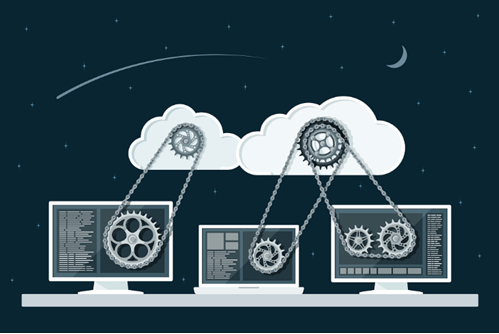Harness the Power of Cloud Simulation: How Simulation Applications are Changing the Game
The global cloud-based simulation application market is a significant change in the organizations’ simulations and modeling strategy. These applications provide a revolutionary solution for industries by utilizing the scalability and on-demand nature of cloud computing for their business needs. Many simulation applications are now based on cloud computing, which means that an organization does not have to invest in expensive hardware or employ people to maintain the equipment. Organizations can rent computational power as needed. Cloud simulation applications help in the manufacturing design and development of products, risk assessment, and simulation modeling and help organizations to experiment, test, and validate hypotheses and models. Driven by increasing market demand for efficient and inexpensive solutions, the global cloud-based simulation application market is set to significantly impact industries’ development in the future, encourage innovation, and promote sustainable growth.
Market Overview and Trends
The global cloud-based simulation application market is expected to grow at a significant CAGR of 11.5% by 2027. Some of the major companies engaged in this market are ANSYS, Autodesk, Dassault Systemes, Exa, Fieldscale, Rescale, Siemens PLM Software, SimCore Technologies, and SimScale and Akamai among others.

The utilization of AI (Artificial Intelligence) and ML (Machine Learning) in cloud-based simulation apps is growing, adding value and increasing efficacy to the systems. Algorithms utilized by AI are responsible for providing efficiency to simulations, expanding the precision of models, and performing multifaceted data analyses. ML allows the prediction of the outcome, modeling adjustments over time, and adaptation of the model for the specific case, minimizing time and financial costs while increasing the reliability of the result.
Cloud-compromising platforms are improving features to provide applications to enhance real-time collaboration of cross-continental teams. The users share the various models in the various projects they are working on with other members of the team to synchronize data and communicate changes within the shortest time, across the globe. This enhancement reduces the time required to develop simulation environments and also enhances the quality of the developed simulations due to the incorporation of knowledge from various domain specialists.
Digital Twin is gradually becoming more popular due to its beneficial use in the real-time monitoring, control, and maintenance of plant systems. Cloud simulations are also essential in the creation and running of a digital twin, it is the processing agent required in the computational calculations that support the digital twin’s analysis of the considerable amount of data from different sensors and feeds.
Cloud providers are taking measures based on continual security improvements to protect data from unauthorized access and to maintain its integrity and privacy. Some of these measures include the application of effective encryption schemes, security assessments frequently, and adherence to the best practices of international norms and provisions.
Since simulation is a business-critical and highly specialized function, several organizations have sought multi-cloud and hybrid-cloud to improve capacities and minimize reliance on one cloud service provider. These approaches also enable the users to exploit the special characteristics of various cloud services and have better and more direct control over their applications and information.
Cost reduction and scalability of solutions coupled with demand for simulation applications are boosting the use of cloud-based simulation applications. Classic conditions for simulation involved significant purchases of hardware and software, and yearly maintenance that are prerequisites for on-premise solutions. However, applications based on cloud services are significantly more affordable as the user has an opportunity to get access to different simulation means, tools, and options in case of need and pay for the used resources only.
Application of Global Cloud-Based Simulation Application across Various Sectors
The cloud-based simulation application market is growing with sectors to improve functionality, cut expenses, and realize innovation. In media and entertainment industries especially the animated film industry, cloud-based simulation applications are being used in the production of spectacular effects and real-life simulation in animations, movies, video games, and other related products. These are the utilization of online-based rendering to perform high-quality graphics and imagery including animation and the usage of simulation tools to model realistic surroundings and characters. Many leading companies such as Dassault Systemes and Exa are offering the media and entertainment industries with cloud simulation solutions that can be used to obtain good quality graphics and simulations.
Simulation applications are implemented in the construction sector they are hosted on the cloud and used for enhancing building design and construction. Building designs are modeled and tested using simulating tools for purposes of validation and also in the use of web-based apps for collaboration among project stakeholders. Siemens PLM Software and SimCore Technologies are some of the digital enablers that are providing cloud-based simulation for the construction industry so that the design and construction processes can be made more efficient.
In the healthcare domain, cloud-based simulation platforms have been implemented as a mode of training healthcare professionals and as a model for medical procedures. The use of simulation models allows students to get real-life experience in managing patients, and the use of social networks in the cloud enables healthcare officers to communicate and coordinate as a team. Rescale and SimScale offer cloud-based simulation to the healthcare manufacturing industry to reduce the rate of accidental errors that may harm or even kill a patient.
In the defense and aerospace industry, the cloud is being applied to the design and analysis of military tools and systems. This includes the use of models and simulations for analyzing and assessing the effectiveness of defense systems and the use of cloud-based collaboration tools for communication purposes to defense operations. Companies such as Akamai and Fieldscale are offering cloud simulation solutions for the defense and aerospace global industry, which allow users to enhance the functionality and efficiency of their military systems.
The advancements in the application of cloud-based simulation have been experienced in the energy and power sector to enhance the design and functioning of power plants and systems. This includes considerations of virtual tool sets for analyzing and describing the functionality of energy-related systems and the utilization of cloud-based solutions for the collaboration of energy-related experts. Manufacturing companies such as SimCore technologies and SimScale offer cloud-based simulation solutions for power and energy industries to support users optimize the performance and durability of their energy-related systems.
Roadblock Challenges Faced by Cloud-Based Simulation Application Market
Several roadblock challenges are becoming apparent in the cloud-based simulation application market and have negatively impacted the growth and adoption of the market. The main issue concerns of multiplicity of approaches and the lack of homogeneity among different simulation tools and interfaces. This puts users in a position where they cannot easily coherently use the tools and platforms, meaning costs and complexity rise. Further, a lack of human capital that has sufficient knowledge to properly apply and manage cloud-based simulation applications. This scarcity of skilled professionals is especially significant in sectors involving the application of simulation tools in the manufacturing and aerospace sectors for the development of products and testing purposes.

Data security and privacy are other major problems accompanying the cloud-based simulation application market. Since simulation data holds a lot of information that cannot be revealed to outside parties, protecting this data is essential. However, the use of cloud applications comes with more security challenges including hacking, and break-ins among others. Thus, the cloud providers are incorporating stringent security measures such as encoding, authentication, and security checking on the cloud, to deal with these issues. However, all these measures have not done enough to stop security breaches from becoming a real threat to users.
It also has difficulties with high costs in using simulation software and hardware in the market environment. Simulation software is expensive and is out of reach of SMEs (Small and Medium Enterprises). Furthermore, the actual costs of the infrastructure necessary to run simulation applications can be very high. This poses a problem since SMEs may lack the capital to invest in the hardware and software required to support the usage of cloud-based simulation applications.
Moreover, the market also has problems associated with the necessity to raise awareness and concern about the value of cloud-based simulation applications. Most of the users do not know the inherent advantages of using simulation applications including enhanced product design and testing, and cost-effectiveness, among others. Such a lack of awareness makes it challenging to implement such applications, as users may not appreciate the need to use their money to acquire them. Hence, the cloud providers have found it necessary to market and educate the community on the advantages of cloud-based simulation applications.
Finally, the market also faces issues with demand for devices that require sturdy and dependable connections. The kind of connectivity that cloud-based simulation applications need includes the simulated applications demand high-speed and reliable connectivity to run smoothly. However, for physical connectivity, the availability and quality of connectivity may be region-specific and infrastructure-dependent. This can prove challenging especially when relying on a limited internet connection in offering users access to cloud-based simulation applications.
In conclusion, the global market for cloud-based simulation applications is expected to grow rapidly over the near future due to the growing need for cheaper, manageable, and collaborative applications across different industries. In the quest for improving operational efficiency, improving decision-making, and driving innovation, organizations have a willing tool in cloud simulation applications to undertake virtual modeling, testing, and analysis. Challenges such as data security, scarcity of skilled professionals, and high connectivity expenses exist. The market is working on these impediments with effective measures toward security, professional management, and connectivity. The growth in understanding of the ability of cloud simulation applications and integration of technology and innovation such as AI and digital twin, is enabling positive changes across industries including manufacturing, healthcare, aerospace, and energy among others, regarding cloud adoption. Through cloud-based simulation applications, organizations can realize other benefits such as efficiency, flexibility, and competitive advantage that will assist them in achieving more sustainable growth and development in their operations due to the emerging and ever-challenging business environment that is characterized by huge volumes of data.